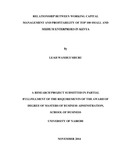| dc.description.abstract | The objective of this study was to investigate the relationship between working capital
management and profitability of top 100 small and medium enterprises in Kenya. This
study adopted descriptive design. The target population of the study was the KPMG top
100 SMEs in Kenya (2013) which were within Nairobi. The study adopted random
stratified sampling; whereby a sample of 30% was selected from the target population of
KPMG top 100 SMEs to give a sample size of 33 SMEs in Kenya. The researcher
collected secondary data. The secondary data was collected from the targeted SMEs and
it included the financial statements of the SMEs from the financial year 2008 to 2012.
The financial statements included the balance sheets and the cash flow statements. The
data was entered in the Statistical package for social sciences software to facilitate for
analysis. Data was analyzed through descriptive and inferential statistics. Frequency
distribution tables, means and standard deviation were used to summarize the data from
respondents. The analysed data was presented in frequency distributions tables and pie
charts. The study found out that there is a positive association between profits of the
small and medium enterprises in Kenya and inventory turnover, receivables, cash
management but negative with payables. The study also found a significant relationship
between the profits of the top 100 SMEs and the working capital variable, that is,
inventory turnover, receivables, cash management and payables. The study concludes
that working capital requirements decide the liquidity and profitability of a firm and
hence affect the financing and investing decisions. Lesser requirement of working capital
leads to less need for financing and less cost of capital and hence availability of more
cash. However the lesser working capital may lead to lost sales and thus may affect the
profitability. The study recommends that managers of the SMEs should focus on
reducing cash conversion cycles and try to collect receivables as soon as possible because
it is better to receive inflows sooner than later. Managers should reduce inventory periods
and try to delay payables because it will provide them opportunities to invest in different
profitable areas thus increasing the firms‘ profitability. Moreover, there is therefore need
for more training on the best practices of working capital management among the SMEs | en_US |

